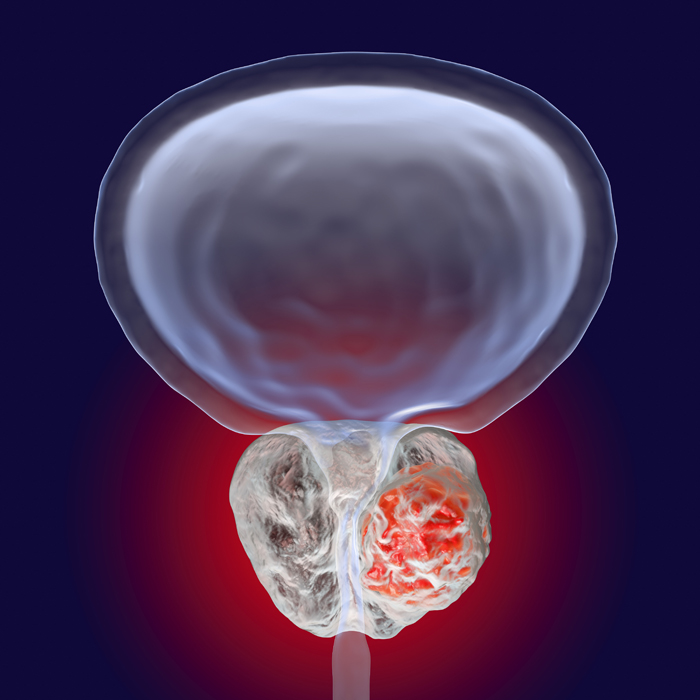Prostate Cancer Treatment in Kondapur, Hyderabad
Prostate cancer is cancer that occurs in the prostate. The prostate is a small walnut-shaped organ in the male body that produces seminal fluids. The seminal fluid nourishes and transports the sperm.
It is a common type of cancer affecting almost a million men a year in India. Prostate cancer begins when the cells in the prostate gland begin to grow out of control.
What is prostate cancer?
Prostate cancer is common cancer among males and has the best chance of treatment if detected in the early stages. The prostate is a small organ found in the lower abdomen of the male body. Located under the bladder and surrounding the urethra, the prostate is regulated by testosterone and produces seminal fluid also known as semen.
Most cases of prostate cancer are adenocarcinoma, which is the type of cancer that grows in the tissue of a gland such as the prostate gland. This cancer can be characterized by how fast it grows- aggressive or non-aggressive. An aggressive cancer is one where cancer grows quickly and might spread to other parts of the body. In the case of non-aggressive cancer, the tumour either grows slowly or not at all.

What are the symptoms of prostate cancer?
In cases of non-aggressive or early stages of cancer, there might not be symptoms. Males who experience symptoms may include:
- Urinary problems like the need to pee often, bleeding while urinating, painful urination and difficulty in maintaining the stream.
- Impotence or erectile dysfunction might be a symptom too.
- Blood in semen
- Pain during ejaculation
- Weight loss, body pain, bone pain might be signs of serious prostate cancer
When to see a doctor?
To avoid symptoms getting worse or cancer going unnoticed in early stages regular screening is recommended. In case of persistent symptoms or pain contact your doctor immediately.
Request an appointment at Apollo Spectra Hospitals, Kondapur
Call 1860-500-2244 to book an appointment
What are the risk factors of developing prostate cancer?
When the cells grow abnormally the tumour can spread to other parts of the body as well. Following risk factors may increase your chance of developing prostate cancer
- Age- The risk of having prostate cancer increases with age. Men above the age of 50 are more likely to have it
- Family history- History of prostate cancer in the family may increase your chance of having it
- Genetics- inherited gene mutations to the BRCA1 and the BRCA2 genes may increase the risk in men of having prostate cancer. These gene mutations also increase the risk in women of developing breast cancer
- Obesity- Maintaining a healthy lifestyle and weight may reduce the risk of having prostate cancer or may at least reduce its aggressivity
To prevent the risk of having prostate cancer you should exercise regularly, maintain a healthy lifestyle and have regular screenings and checkups with your doctor at Apollo Kondapur. Regular checkups can help in catching cancer in its early stage and can avoid further complications and heavy treatments. Your doctor can help you choose the best form of treatment necessary for you.
Prostate cancer is cancer that is formed when there are changes in the DNA of the prostate. These DNA changes may be inherited or acquired during a person's lifetime. Males with early stages of prostate cancer or whose cancer is detected before it becomes aggressive to have a high chance of effective treatment and survival. Prostate cancer grows slowly hence it’s important that with regular screening it is detected in its early stages even when symptoms might not be visible.
Yes, ff caught and treated at an early stage.
It may affect a person’s sexual ability in the later stages of cancer but it may vary from case to case.
Depending on the case your doctor might recommend ‘watchful waiting’ also known as active surveillance which means careful observation of cancer for any changes. In case of progression, the doctor then recommends treatment suitable. This is usually recommended in early stages and non-aggressive forms of cancer. Consult a doctor for the best advice.
Symptoms
Our Top Specialities
NOTICE BOARD
CONTACT US
CONTACT US
 Book Appointment
Book Appointment


.svg)
.svg)
.svg)
.svg)








